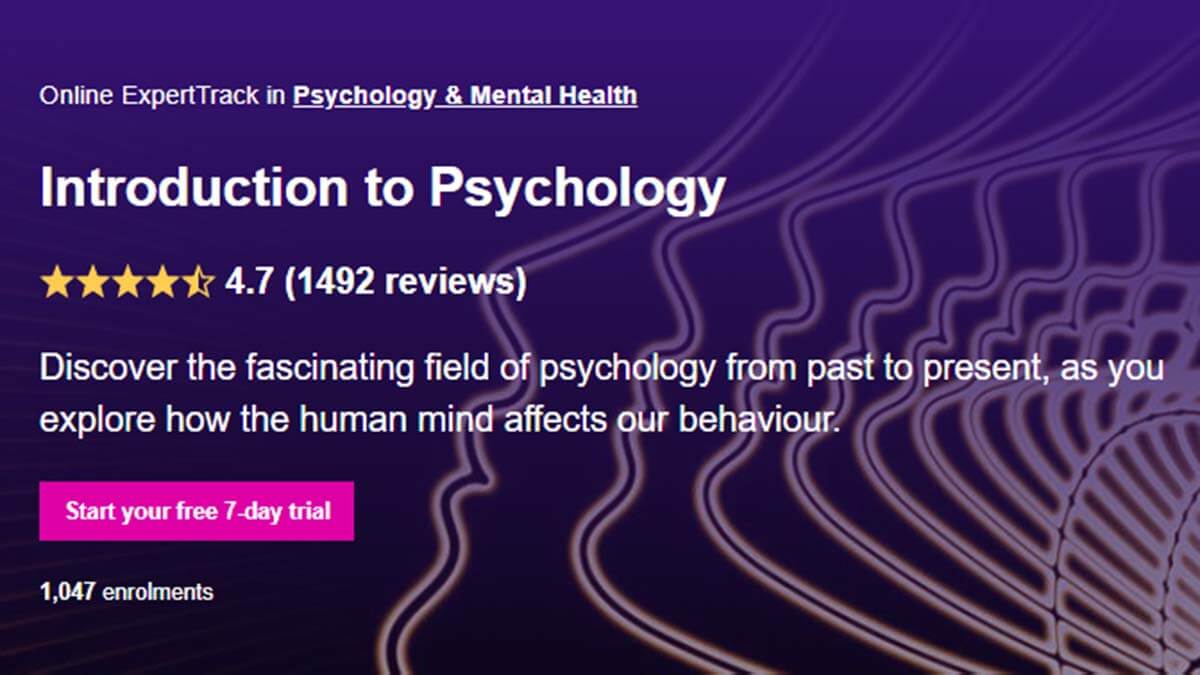Psychology is often associated with a large set of soft skills that have relatively little use in our rapidly evolving digital age. This, however, could not be further from the truth. Knowing the fundamentals of human psychology has tremendous benefits on both a professional and personal level.
Professionals can use psychology to improve their work environments, become better negotiators, or enhance their creativity. On a personal level, learning about the fundamentals of psychology can lead to improved levels of well-being, greater self-understanding, and advanced social skills.
With all that being said, the amount of online courses on psychology is massive. If you are interested in learning psychology, start by getting clear about your end goals. Do you want to get better at communication? Do you want to learn exactly how your brain makes daily decisions? Or, perhaps you have been always interested in the link between criminal behavior and mental illnesses?
A good course answers all of these (and more) questions. To help you choose, we reviewed the 10 best online psychology courses available. All of these courses are led by experts from their field, are backed by decades of study, and are presented in a manner understandable to people new to psychology.
Without further ado, these are the 10 best online psychology courses.
Best Psychology Courses

Best Overall: Introduction to Psychology (FutureLearn x Monash)
- Comprehensive yet concise syllabus
- Free 7-day trial available
- Beginner-friendly
- Best-in-class coverage of behavioral neuroscience
- Led by a top-ranking research university
“Introduction to Psychology,” led by Monash University and offered on FutureLearn, is our pick for the best online psychology class. It teaches students the fundamentals of psychology within a 12-week syllabus, and the expert-curated content provides students with a solid foundation for further studies in the field. But, the usefulness of learning basic principles of psychology is not limited to people looking to pursue an academic degree in the field.
The fundamentals of psychology taught in this class can also be beneficial in marketing, teaching, counseling, and even human resources. Frankly, it is next to impossible to find an industry where basic psychology won’t be helpful. This is why this course is so powerful: it is one of the most widely applicable courses you can take online.
The syllabus is created and led by Monash University, an establishment consistently ranked as one of the top 100 universities in the world (#58 as of the writing of this article), with Prof. Matthew Mundy, a well-respected researcher at the university, being the instructor.
To give you a teaser of what to expect from this class, have a look at a few of the courses included in this ExpertTrack:
- Biological psychology. This course explores the relationship between human biology and behavior.
- Developmental psychology. Here, you’ll learn all about physical, cognitive, and social development.
- Psychology of personality. This course teaches the cognitive factors that influence personality.
- Learning psychology. This course explores how different habits and behaviors are learned.
After completing this course, you will have a clear understanding of how human psychology works. Thus, it will help you improve your social skills, have a greater understanding of yourself, and even know the key facts from the history of modern psychology. With all that being said, it becomes evident that “Introduction to Psychology” deserves the ranking of the #1 best online psychology class.

Best for Persuasion: Influence People with Persuasion Psychology (Udemy)
New customer offer! Top courses from $14.99 when you first visit Udemy (expires 31 March 2024).
- Quick to complete
- Actionable, science-based techniques for effective persuasion
- Techniques applicable in a wide variety of industries
- The content feels repetitive at times
Having a set of good persuasion skills is one of the keys to living a successful personal and professional life. Yet, the science of persuasion is often misunderstood by the general public. Did you know that persuasion has nothing to do with the temperament of an individual? An introvert can be just as successful at persuasion as an extrovert. And, it does not take a master’s or doctoral degree in psychology degree to become better at persuasion.
“Influence People with Persuasion Psychology” from Udemy is a 2-hour introductory course on persuasion. The class is led by Andrew Luttrell, an Assistant Professor of Psychological Science at Ball State University. During the 2-hour duration, Luttrell gives the students a set of actionable persuasion skills (the neuroscience behind the techniques is also included) that anyone can use, regardless of their specific goals.
If you want to get a bit more specific, here are some examples of people who could benefit from such a course:
- Salespeople – Ethical persuasion is one of the fundamentals of becoming successful at sales.
- Managers – All successful leaders have one thing in common – they are great persuaders.
- Fundraisers – Persuading a large set of people to donate to a certain cause takes great persuasion skills.
Even if you do not meet the aforementioned criteria, this short and sweet class can have a positive influence on you. We are all social beings, after all. And, in some form, persuasion and negotiation is behind almost all human communication. So, why not get a competitive advantage by learning about the nuts and bolts of human persuasion.

Best for Anxiety: Stress and Anxiety Management: Psychology (Udemy)
New customer offer! Top courses from $14.99 when you first visit Udemy (expires 31 March 2024).
- The science of stress and anxiety explained clearly
- Contains practical tips for managing stress and anxiety
- Accredited by the International Association of Therapists
- Includes further resources recommended by the instructor
- The presentation of the instructor feels monotone at times
Anxiety disorders are the most common mental illnesses in the US (18,1% of the population is inflicted every year). Not to be too dramatic, but calling it an “anxiety epidemic” is not irrelevant with numbers like these. It is even more staggering, then, that only 36,9% of sufferers of anxiety receive proper treatment.
An online psychology course is NOT a substitute for being treated by a certified therapist. But, learning about the science behind stress and anxiety management is still a very good leap toward getting better.
The “Stress and Anxiety Management” 3.5-hour class from Udemy is led by Elmira Strange, a Motivational Psychologist and a Certified Life Coach. Elmira has put together a class that explains the experiences and science of common anxiety and stress disorders. In addition to this, she also introduces several techniques for managing anxiety and stress in a healthy manner.
I was also impressed by the fact that the class remains realistic throughout. The instructor is well aware that sometimes things like breathing techniques (as useful as they are) simply don’t work. Thus, discussions on topics such as nutrition and pharmacology are also included.
All things considered, this is one of the very best online psychology classes available. It is well developed, easy to understand, and can have a legitimate positive influence on people suffering from excessive stress and anxiety.

Introduction to Psychology (Coursera x Yale)
- Led by a top-ranking university
- Free enrollment possibilities
- A lot of topics covered
- Engaging presentation
With over 620,000 students, “Introduction to Psychology” is Coursera’s most popular online psychology course. It is a 1 15-hour program taught by Paul Bloom, a Yale psychology professor who has been teaching since 1990. He is also an author of several books on psychology with the best-selling “Against Empathy” being the most notable of his works.
“Introduction to Psychology” comes in 6 weekly installments. The topics of these installments are as follows:
- Foundations of modern psychology
- The psychology behind development and language
- Cognitive psychology
- The self and the others
- Human variation
- Psychological measurements of happiness
Some of these concepts might sound unfamiliar to you. If so, do not worry. Bloom presents all of the science in a very easy-to-understand and engaging manner.
The course is also supplemented by various quizzes and reading materials that further help in absorbing all the material taught. The entire course is self-paced, meaning that you can dwell on a certain topic for as long as you need. This is especially helpful for a complete beginner or for someone entertaining the idea of learning psychology at an academic level.
Having access to a course taught by Yale University might already seem almost too good to be true. Throw in the fact that the entire class is free to audit and you have an almost obligatory online course for anyone interested in human psychology.

Empathy and Emotional Intelligence at Work (edX x UC Berkeley)
- Led by a top-ranking university
- Techniques taught can be applied regardless of specific industry
- Free to attend
- Getting a certificate requires payment
In the United States, people spend 1757 hours a year at work. So, as things stand, we can expect to spend approximately one-third of our lives at our workplaces. It is of the essence, then, to prioritize our relationships with our colleagues just as we do with our family members and close ones.
“Empathy and Emotional Intelligence at Work” is a 4-week online psychology course from edX and UC Berkeley. It is intended for anyone looking to improve their well-being in various professional settings. The course is led by Dacher Keltner and Emiliana Simon-Thomas, expert faculty from Berkeley’s Greater Good Science Center.
To give students a hint of what they can expect, here is a quick overview of the topics taught:
- The neuroscience and psychology behind trust, empathy, and cooperation
- Benefits of emotional and social intelligence for the productivity and happiness of an organization
- Science-based strategies for increasing empathy and effective conflict solving in teams
- Socially intelligent leadership
All things considered, it is an eye-opener of a class. After completing, it becomes clear why some workplaces feel more like thriving tight-knit communities rather than corporate machines.
The whole course is a must for anyone looking to understand how well-developed emotional intelligence can positively impact an individual career or even an entire organization.

Introduction to Child Psychology (Udemy)
New customer offer! Top courses from $14.99 when you first visit Udemy (expires 31 March 2024).
- Great for people professionally working with children
- Helpful for parents of small children
- Accredited by the International Association of Therapists
- Only focused on child psychology
When we look at the data, it becomes clear that children are affected by mental health issues almost as frequently as adults. And, considering that mental health illnesses tend to be underdiagnosed in children, the numbers might be much larger in reality. As the mental health of children is getting more and more attention, numerous different career opportunities are also opening up for specialists in child psychology.
“Introduction to Child Psychology” is a great entry point to this fascinating field of psychology. It is a 2-hour introductory course led by Elmira Strange (several other of her courses are also featured on this list). Here, students are introduced to some of the most commonly discussed topics in modern child psychology:
- The 4 distinct parenting styles
- Homeschooling versus traditional schooling in the child development context
- Therapy of young children
- Effects of parental separation on the mental health of a child
- Cultural and societal effects on the development of a child
For a parent or a caregiver of a young child, learning about the fundamentals of child psychology can be tremendously helpful. But, even people with no children under their wing can benefit from such a class. After all, we are all products of our upbringing. And, as you will see, learning about some of the science behind our development can effectively help us understand our present selves as well.

The Science of Happiness (edX x UC Berkeley)
- Led by Berkeley
- Great balance of practical and theoretical lessons
- Contains science-backed techniques for raising happiness levels
- Free to audit
- Certification requires payment
Consistent happiness is something every human being dreams of. It is interesting, then, that we rarely think about what makes up happiness in scientific terms. I don’t want to get ahead of myself, but let me tell you this – the online psychology course we are looking at next will show that happiness is not at all what we think it is.
“The Science of Happiness” from edX and UC Berkeley is an 11-week course on the science of happiness. It is a free course (with an option of purchasing a certificate of completion) that dives headfirst into the many facets of human happiness. Why does happiness have so little to do with materialism? Why are social connections the key to happiness? How can mindfulness create long-term happiness?
All of these (and many more) questions about happiness get answered by the great minds from UC Berkeley. Of course, the class also offers numerous practical techniques for cultivating happiness in both yourself and the people around us. Without giving anything away, I can safely say that this online psychology course has a fair share of “eureka!” moments for anyone interested in the human mind.
All things considered, “The Science of Happiness” from edX is a solid investment for anyone looking for a greater understanding of happiness, one of the most basic pursuits of all humanity.
For those of you thirsty for more science on positivity after completing the course, I would also suggest reading “Stumbling on Happiness” by Daniel Gilbert. It is a captivating read that further discusses much of the concepts presented in “The Science of Happiness” from edX.

Psychological First Aid (Coursera x Johns Hopkins University)
- Great for learning how to deal with psychological trauma
- Teaches models that can be applied both by groups and individuals
- A quick and concise course
- Assessments do not always correlate to the lessons
Emergencies come in many forms. When you accidentally cut yourself, you apply a band-aid. But, what do you do when a sudden psychological crisis hits you? Death of a loved one, a divorce, or sudden financial ruin. These are only some of the mental emergency scenarios all-too-familiar to so many of us.
Unfortunately, trauma does not come calling and is often out of our control completely. Thus, it is not possible to prevent mental trauma entirely. It is possible, however, to “soften the blow” and have a mental set of tools that you can turn to when a psychological crisis hits.
Coursera’s “Psychological First Aid” is a quick 6-hour course presented by George Everly Jr. Everly is an award-winning author and researcher from the renowned Johns Hopkins University. His class introduces the students to the RAPID model (reflective listening, assessment of needs, prioritization, intervention, and disposition). This model is used to build resilience in vase of mental emergency and can be applied in a wide variety of scenarios. For example, the RAPID model can be useful in healing trauma caused by falling victim to a crime. But, it can also help in more common scenarios such as workplace bullying or sudden loss of a job.
For a course that takes only 6 hours to finish, the benefits can be immense. After all, you probably already have an emergency cabinet for dealing with physical trauma. So, why not also prepare for when psychological trauma strikes?

Forensic Psychology (Udemy)
New customer offer! Top courses from $14.99 when you first visit Udemy (expires 31 March 2024).
- Includes recommendations for further sources on forensic psychology
- Easy to follow syllabus
- Lack of real-world examples to supplement the material
- Relatively small amount of content
There is something fascinating about the psychology behind criminal behavior. Can some common mental disorders predict criminal behavior? Why do some people from poor social circumstances turn out fine, while some slide towards antisocial behavior from very early childhood? Questions such as these have been relevant in criminology for more than a century. To get a quick understanding of up-to-date criminal psychology, Elmira Strange offers another great online psychology course.
“Forensic Psychology” from Udemy is a 2.5-hour crash course on criminal psychology. It is a short but captivating online course on psychological theories of criminal behavior. To give you a sense of what to expect, here is a quick rundown of the topics discussed:
- Common mental health issues of criminal offenders
- Prominent characteristics of sex offenders
- The link between personality disorders and criminal offense
- Signs of psychopathy
- Introduction to forensic research
As all the psychology courses from Elmira Strange, “Forensic Psychology” is also accredited by the International Association of Therapists.
All things considered, this course is a bullseye for anyone with even a passing interest in psychology. It is concise, easy-to-understand, and oh-so-interesting.

The Science of Everyday Thinking (edX)
- Free to audit
- Led by the University of Queensland
- Great for cultivating greater mental focus
- Certification requires extra payment
Ever since “Thinking, Fast and Slow” by Daniel Kahneman hit the shelves in 2013, the concepts of fast and slow thinking reached the mainstream. This global bestseller immediately had a profound impact on both economics and psychology. “The Science of Everyday Thinking” from edX is heavily reliant on this famed theory. If this is your first time hearing about fast and slow thinking, allow me to explain the concept with a few keywords:
- Fast thinking – Unconscious, emotional, instinctive. Fast thinking consumes less energy, which makes it the default mode of mental activity for most of us.
- Slow thinking – Conscious, focused, problem-solving, rational. Slow thinking is deliberate, requiring much more mental energy than fast thinking.
“The Science of Everyday Thinking” is a 12-week course from The University of Queensland. The class is aimed at students looking for a greater understanding of their daily thought processes, decisions, and judgments. Without giving too much away, I suspect that most of you will be surprised to see how many of your thought processes are entirely automated. This, of course, is something that marketers and salespeople will gladly take advantage of.
If you want to get more deliberate about your daily mental activity, a course such as this is a great investment. Not only does it explain the neuroscience behind our decision-making, but it also shows the students practical techniques for cultivating their critical thinking abilities. Thus, leading to improved, more deliberate daily decision making.
In a nutshell, “The Science of Everyday Thinking” is yet another eye-opening psychology course. A course that can be beneficial to everyone looking for a greater self-understanding.




